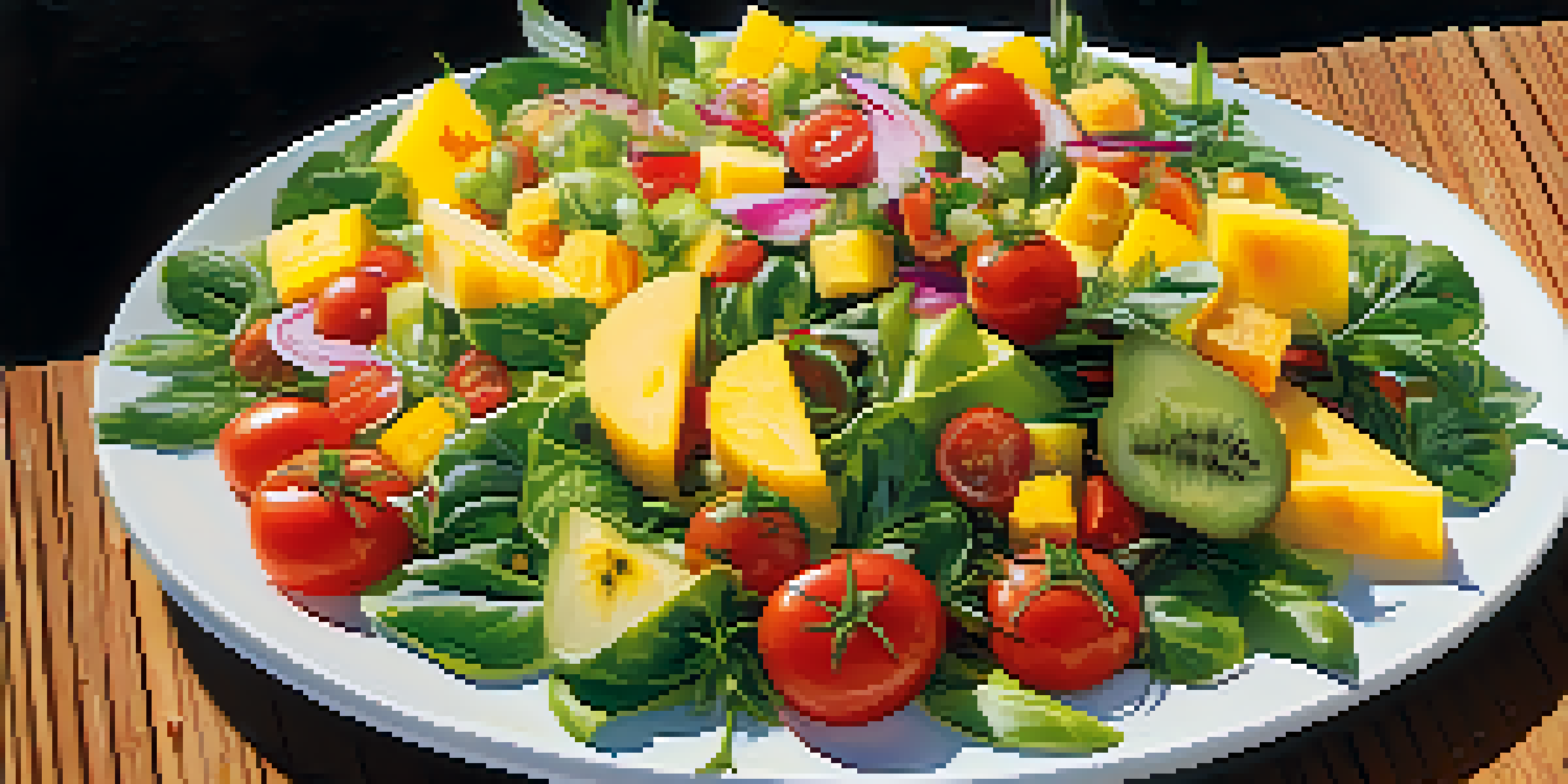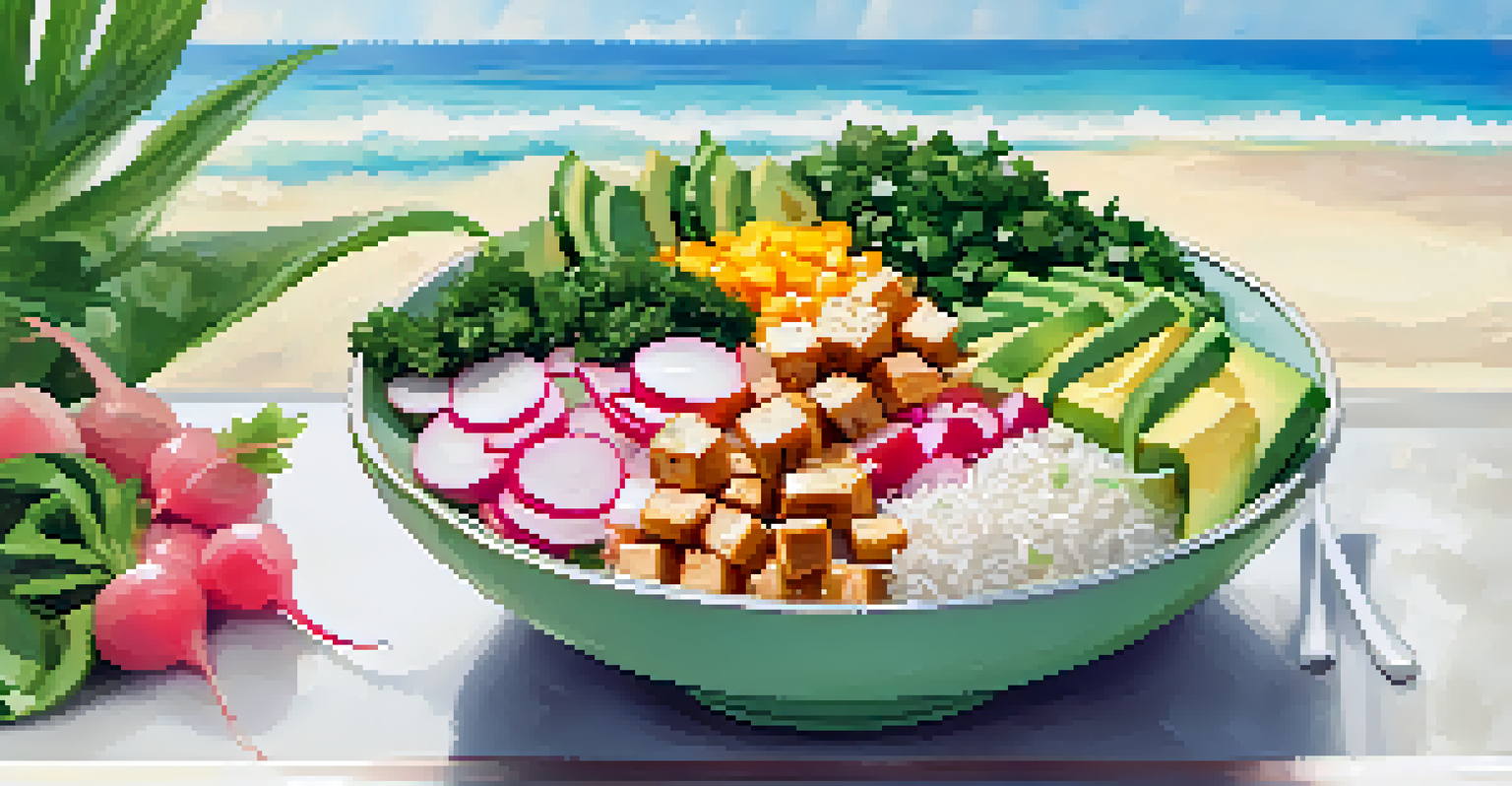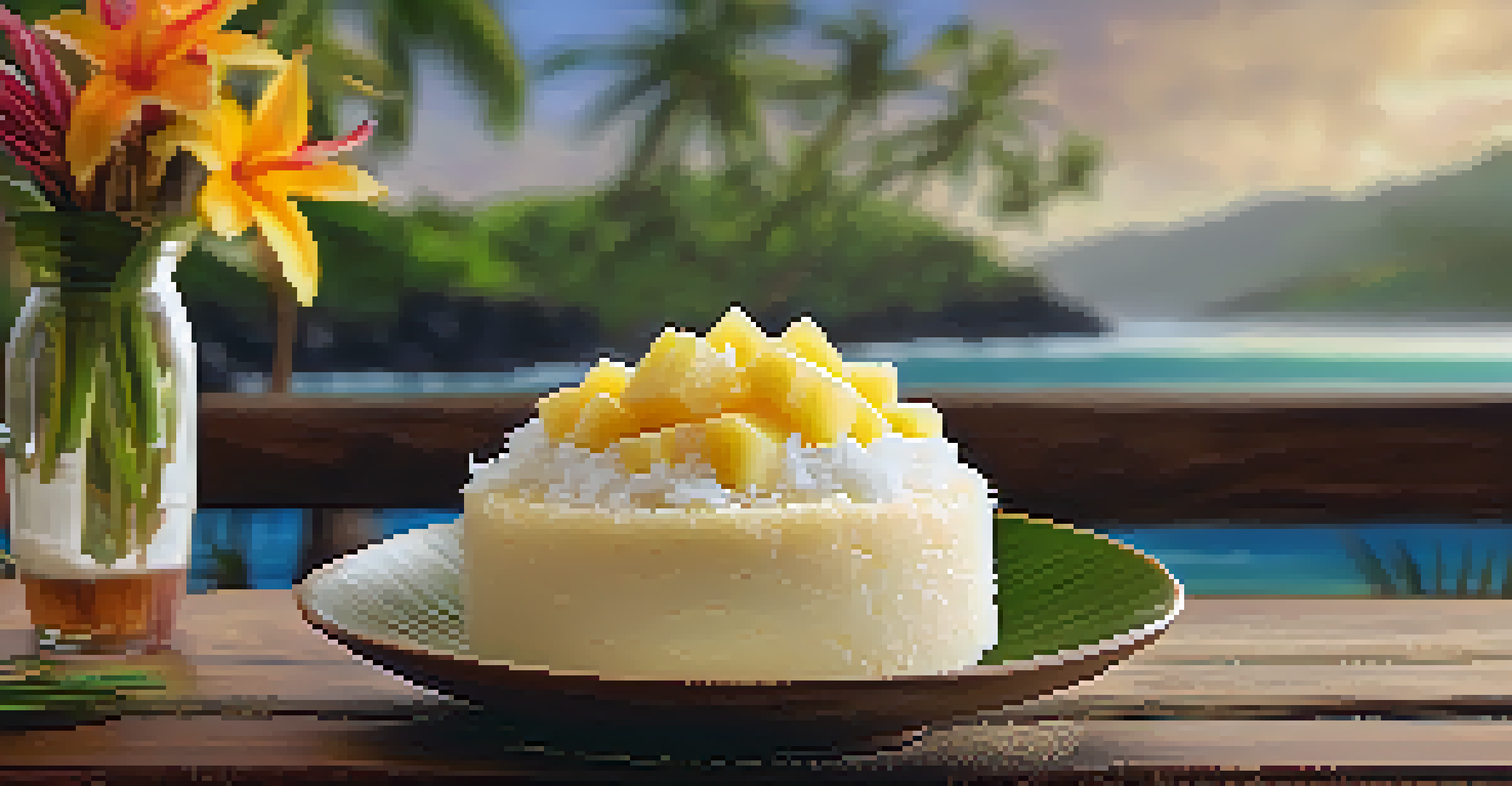Vegetarian and Vegan Options in Traditional Hawaiian Cuisine

Understanding Traditional Hawaiian Ingredients
Traditional Hawaiian cuisine is rich in flavors and ingredients, many of which are naturally vegetarian or vegan. Staples like taro, sweet potatoes, and various fruits provide a solid foundation for plant-based meals. These ingredients hold cultural significance, often being used in traditional dishes that celebrate the land and sea.
Food is not just fuel; it's an experience. It's a way to connect with culture, history, and the land around us.
The use of fresh, local produce is central to Hawaiian cooking, making it easier to create vegetarian and vegan options. For instance, the taro plant is not only a staple food but is also used to make poi, a popular dish among locals. Understanding these ingredients opens up a world of culinary possibilities in plant-based Hawaiian cooking.
Moreover, the incorporation of herbs and spices, such as ginger and green onions, enhances the flavor profile of vegetarian dishes. Their vibrant flavors can transform simple ingredients into something extraordinary, ensuring that every bite is a delightful experience.
Classic Hawaiian Dishes with a Vegan Twist
Many traditional Hawaiian dishes can easily be modified to fit vegetarian or vegan diets. For example, the popular poke bowl, usually made with raw fish, can be adapted using marinated tofu or vegetables. This creative twist not only respects the essence of the dish but also caters to those who prefer plant-based options.

Another classic dish, loco moco, traditionally consists of rice, a hamburger patty, fried egg, and gravy. A vegan version can substitute the patty with a flavorful bean or lentil mixture, topped with a rich mushroom gravy. This adaptation retains the comforting qualities of the original while being completely plant-based.
Hawaiian Ingredients for Plant-Based Meals
Traditional Hawaiian ingredients like taro and sweet potatoes form a solid foundation for delicious vegetarian and vegan dishes.
These adaptations showcase the versatility of Hawaiian cuisine, proving that you can enjoy traditional flavors while adhering to a vegetarian or vegan lifestyle. With a little creativity, you can savor the essence of Hawaii without compromising your dietary choices.
Fresh and Flavorful Side Dishes
Side dishes in Hawaiian cuisine often feature a bounty of vegetables and grains, making them excellent options for vegetarians and vegans. Aloha salads, typically made with fresh greens, ripe tomatoes, and tropical fruits, provide a refreshing accompaniment to any meal. Adding a simple vinaigrette elevates these salads, making them a staple at any Hawaiian gathering.
The act of eating is an act of agriculture; it connects us to the earth and to each other.
Another popular side is the Hawaiian-style mac salad, which can be easily made vegan by substituting traditional mayonnaise with a plant-based alternative. This creamy dish, often served at potlucks, shines with the addition of vegetables like peas and carrots, making it both satisfying and colorful.
These side dishes not only complement main courses but also highlight the diverse flavors of the islands. They reflect the abundance of fresh produce available in Hawaii, ensuring that every meal is both nourishing and delicious.
Fruits: The Heart of Hawaiian Vegan Desserts
Hawaiian cuisine celebrates a variety of tropical fruits that can easily be transformed into decadent vegan desserts. Fruits like pineapple, mango, and coconut are not only delicious but also add natural sweetness to dishes. For example, a simple fruit salad can become a delightful dessert when drizzled with a little lime juice and sprinkled with shredded coconut.
Another popular option is haupia, a traditional coconut pudding that can be made vegan by using coconut milk and starch. This creamy dessert is often served at luaus and celebrations, showcasing the rich flavors of the islands. Its smooth texture and subtle sweetness make it a favorite among both locals and visitors.
Creative Vegan Adaptations of Classics
Many traditional Hawaiian dishes can be easily modified to fit vegetarian or vegan diets without losing their authentic flavors.
Incorporating these fruits into desserts not only satisfies your sweet tooth but also provides a healthy alternative to processed sugars. The vibrant colors and flavors of tropical fruits are a feast for the senses, making every dessert a celebration of Hawaiian culture.
Embracing Local Farmers and Sustainable Practices
The farm-to-table movement is gaining traction in Hawaii, emphasizing the importance of local produce in both traditional and modern dishes. By sourcing ingredients from local farmers, chefs can create vegetarian and vegan meals that are fresh, flavorful, and sustainable. This practice not only supports the community but also reduces the carbon footprint associated with importing food.
Farmers' markets across the islands offer a plethora of organic fruits and vegetables, making it easy to find ingredients for plant-based cooking. Engaging with local vendors provides insight into the unique varieties of produce grown in Hawaii, inspiring creativity in the kitchen. Plus, it's a wonderful way to immerse yourself in the local culture.
By embracing sustainable practices, Hawaiian cuisine continues to evolve while respecting its roots. This dedication to local sourcing ensures that the flavors of the islands remain vibrant and accessible for everyone, including those on vegetarian and vegan diets.
Navigating Hawaiian Restaurants as a Vegetarian or Vegan
Dining out in Hawaii as a vegetarian or vegan can be a delightful experience with a little planning. Many restaurants now offer dedicated vegetarian and vegan menus, showcasing the islands' abundance of plant-based ingredients. Checking online menus or calling ahead can help you discover exciting options before you arrive.
In addition, don't hesitate to ask chefs about modifying dishes to fit your dietary needs. Many are happy to accommodate requests, whether it's swapping out meat for tofu or adjusting sauces to be plant-based. This openness to customization reflects the hospitality of Hawaiian culture, ensuring that everyone can enjoy a satisfying meal.
Emphasis on Local and Sustainable Eating
The farm-to-table movement in Hawaii supports local farmers and promotes sustainable practices, enhancing the freshness of plant-based meals.
Exploring local eateries and food trucks can also lead to unexpected culinary delights. You'll often find creative vegan options inspired by traditional Hawaiian flavors, making each dining experience a unique adventure.
Cultural Significance of Plant-Based Eating in Hawaii
Plant-based eating has deep roots in Hawaiian culture, with many traditional practices emphasizing sustainability and respect for the land. Historically, the indigenous people of Hawaii relied heavily on agriculture, cultivating crops like taro and sweet potatoes. This connection to the land fosters a sense of community and gratitude for the resources it provides.
Moreover, the Hawaiian concept of 'malama 'aina,' which means to care for the land, aligns perfectly with vegetarian and vegan lifestyles. This philosophy encourages mindful eating and sustainable practices, ensuring that future generations can enjoy the island's natural bounty. As more people adopt plant-based diets, the cultural significance of these practices continues to grow.

By embracing vegetarian and vegan options, individuals can connect with Hawaii's rich heritage while promoting a healthier planet. This blend of tradition and modern dietary choices creates a unique culinary landscape that celebrates both the past and the future.